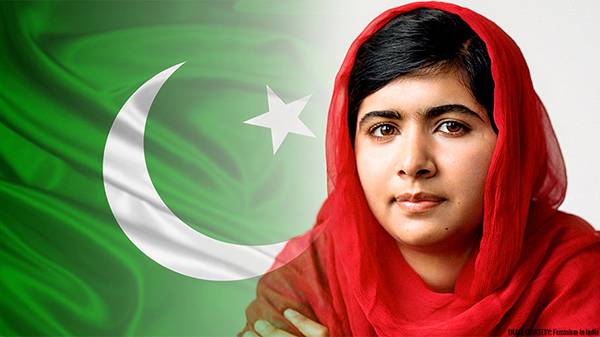
Malala faced social media backlash for good-humoredly tweeting the similarities between the dress she was wearing at the time of the IPhone 11 Pro’s launch and the phone’s much-satirized triple camera feature.
When Malala joined the Twitterati in lightheartedly poking fun at iPhone 11 Pro’s redundant change in features, Pakistani social media users were outraged. She was bashed for not advocating for the rights of Indian Occupied Kashmiris as vocally as she should have. She was accused of being silent because of being a Western and Indian ‘pawn’.
Popular Pakistani actress and host, Mathira Mohammed joined in, stating “First of all she has the time to post about iPhone stuff why not Kashmir I don’t get it her one tweet against Priyanka and Kashmir will help. But she is worried about her dress and iPhone!”. Malala hasn’t responded to any of the backlash.
https://twitter.com/XheikhAli/status/1171836900283506689?s=20
https://twitter.com/PakistanMGC/status/1171886119203553280?s=20
https://twitter.com/ZarrarSays/status/1171998610810114048?s=20
Contrary to the widespread hatred, Malala did respond to the Kashmir crisis in August, but the insatiable Pakistani social media users disliked that she didn’t condemn Modi by name.
Her tweet wasn’t patriotic enough for them. They disliked that she wasn’t playing into the hateful, antagonistic narratives being cultivated on both sides of the border.
Malala extends empathy to the plight of the Kashmiris, especially highlighting the vulnerable position of the women and children and demands for an international peaceful resolution to the crisis. She therefore used her political voice meaningfully, directing it towards shedding light to the invisible stakeholders and adopting a solution based message.
https://twitter.com/Malala/status/1159301216125538304?s=20
Why criticise Malala?
Pakistanis are so quick to criticize Malala, consistently not giving her the benefit of the doubt, because of their increased suspicion of her. This unjustified suspicion is not only a domestic product. Rather than being portrayed as one of the many Pakistanis and Muslims standing up against violence, Western media uproots her from her local Pashtun context, portraying her as an exception. This misrepresentation alienates the Pakistani population, her appreciation threatening their fragile nationalism.
However, that is no excuse to expect Malala’s each and entire movement to be representative of her Nobel Peace Prize. She should be allowed to have a personal life, along with a political one. She should be allowed to occasionally engage light heartedly with her social media followers. These unrealistic standards are an unnecessary emotional burden for a young woman trying her best to make a increase literacy amongst girls all over the world.
It is hard for Pakistani masculinity to reconcile her image as a national hero with her outspoken condemnation of gender stereotypes. Their traditions are threatened, and thus Malala’s identity as an individual is continuously compromised to uphold elements of our culture that might be doing more harm to us than good.
Malala’s freedom of speech is continuously brought into scrutiny because of the patriarchal insecurity about gender roles.
When Malala joined the Twitterati in lightheartedly poking fun at iPhone 11 Pro’s redundant change in features, Pakistani social media users were outraged. She was bashed for not advocating for the rights of Indian Occupied Kashmiris as vocally as she should have. She was accused of being silent because of being a Western and Indian ‘pawn’.
Popular Pakistani actress and host, Mathira Mohammed joined in, stating “First of all she has the time to post about iPhone stuff why not Kashmir I don’t get it her one tweet against Priyanka and Kashmir will help. But she is worried about her dress and iPhone!”. Malala hasn’t responded to any of the backlash.
https://twitter.com/XheikhAli/status/1171836900283506689?s=20
https://twitter.com/PakistanMGC/status/1171886119203553280?s=20
https://twitter.com/ZarrarSays/status/1171998610810114048?s=20
Contrary to the widespread hatred, Malala did respond to the Kashmir crisis in August, but the insatiable Pakistani social media users disliked that she didn’t condemn Modi by name.
Her tweet wasn’t patriotic enough for them. They disliked that she wasn’t playing into the hateful, antagonistic narratives being cultivated on both sides of the border.
Malala extends empathy to the plight of the Kashmiris, especially highlighting the vulnerable position of the women and children and demands for an international peaceful resolution to the crisis. She therefore used her political voice meaningfully, directing it towards shedding light to the invisible stakeholders and adopting a solution based message.
https://twitter.com/Malala/status/1159301216125538304?s=20
Why criticise Malala?
Pakistanis are so quick to criticize Malala, consistently not giving her the benefit of the doubt, because of their increased suspicion of her. This unjustified suspicion is not only a domestic product. Rather than being portrayed as one of the many Pakistanis and Muslims standing up against violence, Western media uproots her from her local Pashtun context, portraying her as an exception. This misrepresentation alienates the Pakistani population, her appreciation threatening their fragile nationalism.
However, that is no excuse to expect Malala’s each and entire movement to be representative of her Nobel Peace Prize. She should be allowed to have a personal life, along with a political one. She should be allowed to occasionally engage light heartedly with her social media followers. These unrealistic standards are an unnecessary emotional burden for a young woman trying her best to make a increase literacy amongst girls all over the world.
It is hard for Pakistani masculinity to reconcile her image as a national hero with her outspoken condemnation of gender stereotypes. Their traditions are threatened, and thus Malala’s identity as an individual is continuously compromised to uphold elements of our culture that might be doing more harm to us than good.
Malala’s freedom of speech is continuously brought into scrutiny because of the patriarchal insecurity about gender roles.
